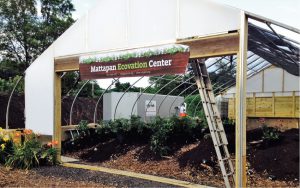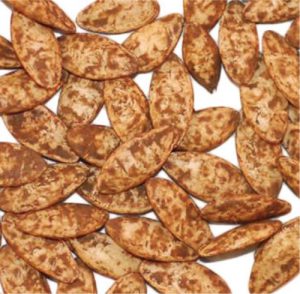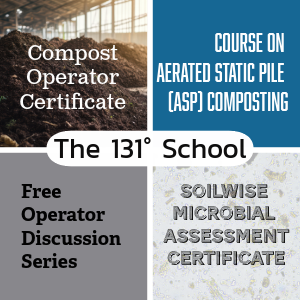BioCycle September 2015
Boston, Massachusetts: Composting And Greenhouse Production
A compost-heated greenhouse recently came online in Boston at the Mattapan Ecovation Center, a 2,800 square foot state-of-the-art integrated greenhouse that includes a unique compost heat recovery system. The project was built at the City of Boston’s yard trimmings composting site, which is managed by City Soil & Greenhouse. Construction of the Ecovation Center was funded with an Urban Agriculture Grant from the Massachusetts Department of Agricultural Resources. The grant was awarded to City Soil & Greenhouse, and the Suffolk County Conservation District (SCCD), an urban conservation district that services the community where the Ecovation Center is located.
The Ecovation Center couples an aerated static pile (ASP) composting system with greenhouse heating, water vapor reclamation for irrigation, and CO2 enrichment to increase crop production and extend the growing season. The heat generated by the compost pile is captured by the Compost Heat Wagon, a patented compost aeration and heat exchange system that pulls hot air from the compost and transfers it to a hot water hydronic heating system in raised beds in the greenhouse. After the compost vapor is run through the heat exchanger it is exhausted into a biofilter under the seedbeds, which captures odors and injects CO2 emissions into the seedbed. One side of the greenhouse houses the composting section and the other side contains the growing beds. The Compost Heat Wagon aeration and heat recovery system was built by Agrilab Technologies, Inc.
The Mattapan Ecovation Center is designed to be self-sustaining through rent for greenhouse crop production space, tip fees for incoming organics and grant support for educational programming. The Ecovation Center is growing tomatoes, culinary and medicinal herbs, as well as propagating perennial plants and trees for use in the surrounding landscape and plants for green roofs to demonstrate that crops with commercial value can be produced there. Site preparation included preparing a base for 3,000 square feet of additional four-season cropping systems that are suitable for low tunnel and greenhouse expansion. More than 75 percent recycled steel, lumber and organic materials were used in construction of the greenhouse frame and growing beds. “The Mattapan Ecovation Center serves as a template for future collaborative projects between SCCD, City Soil, government agencies, and institutional and private landowners in converting liabilities into important assets in the regional food system,” notes Bruce Fulford, owner of City Soil & Greenhouse.
Sacramento, California: Senate Bill Requires Adequate Organics Recycling Infrastructure
In late August, the California Senate passed AB 876, authored by Assembly Member Kevin McCarty (D-Sacramento), which requires local governments, beginning August 1, 2017, to assess the amount of organic waste that will be generated in a region over a 15- year period, and identify locations for new or expanded organic waste recycling facilities capable of handling this material. Local governments have long been required to plan for 15 years of disposal capacity to avoid running out of landfill space, but, as the state begins to successfully divert organics from landfills, it is becoming increasingly important to plan for composting and anaerobic digestion facilities that will be necessary to handle this material, notes Californians Against Waste, an AB 876 supporter.
Recovering organics is a key component to achieving California’s policy goal that not less than 75 percent of solid waste generated be source reduced, recycled, or composted by 2020. In addition, the California Air Resources Board has set a goal of “effectively eliminating disposal of organic waste at landfills” by 2025 to prevent landfill methane emissions, and Governor Jerry Brown has established a “Healthy Soil Initiative” to increase use of compost to increase water retention and remove carbon from the atmosphere. After passage by the Senate, AB 876 was headed to the desk of Governor Jerry Brown for approval.
Kutztown, Pennsylvania: Novel Approach To Deploying Compost Microbes
Soil-borne plant pathogens are a constant issue for plant production, particularly in greenhouse operations. Many soil-borne pathogens have wide host ranges and the allowable options for control in organic agriculture are few. With a grant from the Organic Farming Research Foundation, researchers from Rodale Institute in Kutztown, and Cornell University in Ithaca, New York, are examining a novel approach to deploying the microbial content of compost onto the seed surface for protection against common, soil-borne plant pathogens.
Previous studies have confirmed consistent disease suppression using solid and liquid forms of organic amendments and have attributed these benefits to a subset of microbes from the bulk compost material that colonize the seed surface. The microorganism(s) responsible for disease suppression is only at best weakly understood. Therefore, a general composition of microbes from compost extract are being used to design a low-cost, high quality seed treatment for protection from soil-borne plant pathogens. Four steps are involved in developing the tool: 1. Creating the compost and extracting microbes from the compost; 2. Converting the compost extract solution into a viable microbial powder; 3. Coating the seeds with the powder; and 4. Testing efficacy of the seed treatment.
Rodale Institute incorporates a number of feedstocks in its composting recipe (windrow composting is used), including a variety of animal manures, vegetable waste, leaves, grass and a mix of other agricultural wastes. The volume of each material, pile temperature, moisture content, volume reduction, and nutrient content are recorded. Cured compost is used to make 7-day old, nonaerated compost extract. After the extraction period, the solution is freeze-dried into a fine powder. The dried powder contains soluble minerals, nutrients, organic matter, and beneficial microbes, particularly bacteria. The powder is applied to the seed surface using standard seed-coating technologies. Project leaders are conducting disease bioassays to determine if the freeze-dried application is effective at suppressing soil-borne plant pathogens.
The efficacy of the treatment will be tested in bioassays and the impact of freeze-drying microbes on microbial viability needs to be determined. Additionally, based on results from disease bioassays, it is possible that the level of powder treated on the seed surface will need to be examined for effective coverage and sufficient disease suppression. The pathogen causing seed and seedling damping off, Pythium aphanidermatum, will be exposed to seed treated with freeze-dried compost extracts and assessed for disease. In addition, the microbial content will be quantified at each stage of production in order to determine loss of microbial viability. Final project results will be available for public access as well as published in peer-reviewed journals by the end of 2015. — Rick Carr, Rodale Institute
Boston, Massachusetts: Worker Cooperative Collects Food Scraps
CERO Cooperative, Inc. is a bilingual, multicultural worker-owned cooperative business “started to provide needed environmental services in their neighborhoods while creating dignified sustainable jobs in which the employees are both investors and owners,” notes the co-op’s website. CERO, Spanish for zero, stands for Cooperative Energy, Recycling & Organics. “We decided to seize on the opportunity provided by the Massachusetts commercial food scraps disposal ban that went into effect on October 1, 2014, by offering organics collection services,” explains Lor Holmes, a CERO cofounder. CERO Co-op assists businesses and institutions generating one ton or more per week of food scraps in conducting waste audits and setting up source separation programs. Collected organics are taken to a farm outside of Boston for composting. CERO also sells the finished compost for food production in Boston.
In a unique direct public offering, CERO Cooperative, Inc. raised over $370,000 from community investors to fund its start up, including obtaining a truck for organics collection. Since September 2014, 83 investors from the Boston area and across Massachusetts put in amounts of $2,500 or higher. In return, notes CERO’s website, they “stand to receive a potential 4 percent dividend but also invest because they support CERO as a viable venture with a social mission.”
















